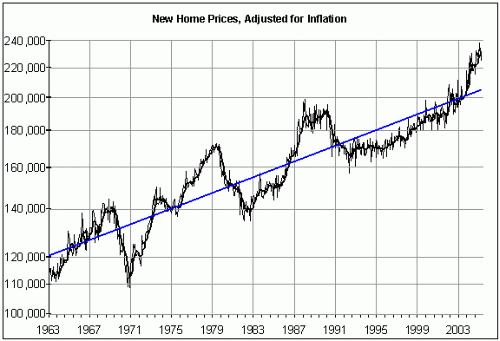The Great Real Estate Dilemma
As you probably know from my previous real estate posts, I believe that we’re past due for a real estate bust. This week I came accross another very interesting article related to the topic by Dr. Steve Sjuggerud. I’m not sure I’m in full agreement with the article, but it does provide some very interesting arguments that are definetely worth reading.
For example, the graph above shows the prices of new houses adjusted for inflation. There are a few interesting points to notice about this graph. First, the general trend over time has been upwards. That is, as populations increase and space within cities become more condensed, prices have to go up, that’s the law of supply and demand. What’s also very interesting is that the prices have not always gone up steadily, there have been some drastic dips!
The delimma faced by today’s real estate investors is whether or not to buy, or to hold out until the bust when you can buy properties for much cheaper. Based on the fact that interest rates have nowhere to go but up, and the effect interest rates have on property prices, I know a lot of you out there are thinking of waiting it out. The reality is that a great investor can invest successfully in any market! The key is what you select and how you finance it. That’s the topic of this article.
If you look closely again at the graph above you’ll quickly notice that over the last 40 years that no dip has lasted 10 years. Although this graph is for new houses, let’s take the assumption that it applies for all housing (since conceptually it’s very similar). Therefore, assuming that you buy a property at the very height of a boom, if you can hold it for at least 10 years, than by all accounts you should be able to sell it at least the price you paid! At quick glance, that might not look so good, but take a second to think about it…
This means that no matter what the market, if you have at least a 10 year fixed mortgage at today’s interest and you can hold it for at least 10 years, you’ll make money (assuming you picked a good income property). At the very least you’ll have paid down the equity with your rental income. However, chances are that you will be able to sell it at a price higher than what you paid for at at least one point over those 10 years.
All said and done, it’s important for today’s investor to lock in their interest rates for at least 10 years and select positive cash flow properties. Actually, You should never purchase a negative cash flow property!!! Why would you? How can you call it an income property when you continually dump money into it? What’s the benefit of it? I’ve heard people say that they will make their profit when they sell. Why would you want to do this? You might need to make payments for who knows how many years before you can sell at a profit, maybe as much as ten years. How much profit will you really make? If I have a negative cash flow of say $200/mth for 10 years (which some people accept today), that’s $24,000 that you will need to put into your property over those 10 years.
|
Scenario 1 – $200/mth Negative Cash Flow |
|
|
Total cash flow payments over 10 years |
$24,000.00 |
|
Total Annuity earned on $24,000.00 |
$7,056.46 |
|
Total equity paid down |
$37,711.66 |
|
Total |
$6,655.11 |
|
Scenario 2 – Break Even Cash Flow |
|
|
Total cash flow payments over 10 years |
$0.00 |
|
Total Annuity earned on $24,000.00 |
$0.00 |
|
Total equity paid down |
$37,711.66 |
|
Total |
$37,711.66 |
|
Scenario 3 – $200/mth Positive Cash Flow |
|
|
Total cash flow payments over 10 years |
$24,000.00 |
|
Total Annuity earned on $24,000.00 |
$7,056.46 |
|
Total equity paid down |
$37,711.66 |
|
Total |
$68,768.12 |




· October 5th, 2007 · 8:34 am · Permalink
[…] their purchases of these assets on the anticipation that their prices will continue to increase. Some of these investors may have a ‘negative carry’ in that the interest rates on the fu…; these investors anticipated that they would be able to use the increase in value of the asset as […]
· October 16th, 2007 · 10:07 pm · Permalink
[…] What does this all lead to? Well over time an asset can only deviate so much above or below its intrinsic (real) value before it has to re-align itself (adjust its price back to a reasonable value). Right now, at least in North America for sure, prices of real estate properties have deviated significantly above their intrinsic value, so much so that they are now correcting themselves and trying to re-adjust to their intrinsic value. And don’t think we’re there yet, they’ve still got a lot of re-adjusting to do. I expect significantly more fallout before it stabilizes. As a very basic general rule of thumb, a real estate investment property should generate you at least a yearly revenue of 10% of the purchase price (including all costs – renovations, closing costs, etc.). Right now we’re not even close to this, many properties are running at negative cash flow values! This isn’t sustainable. […]